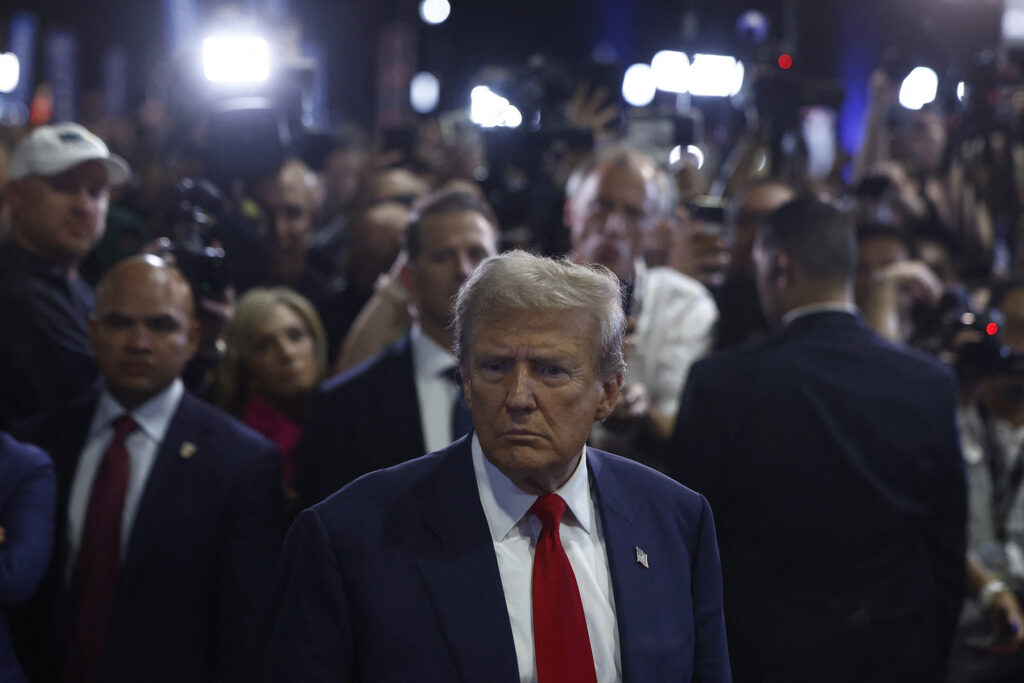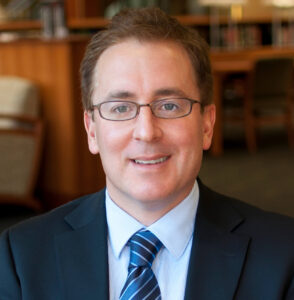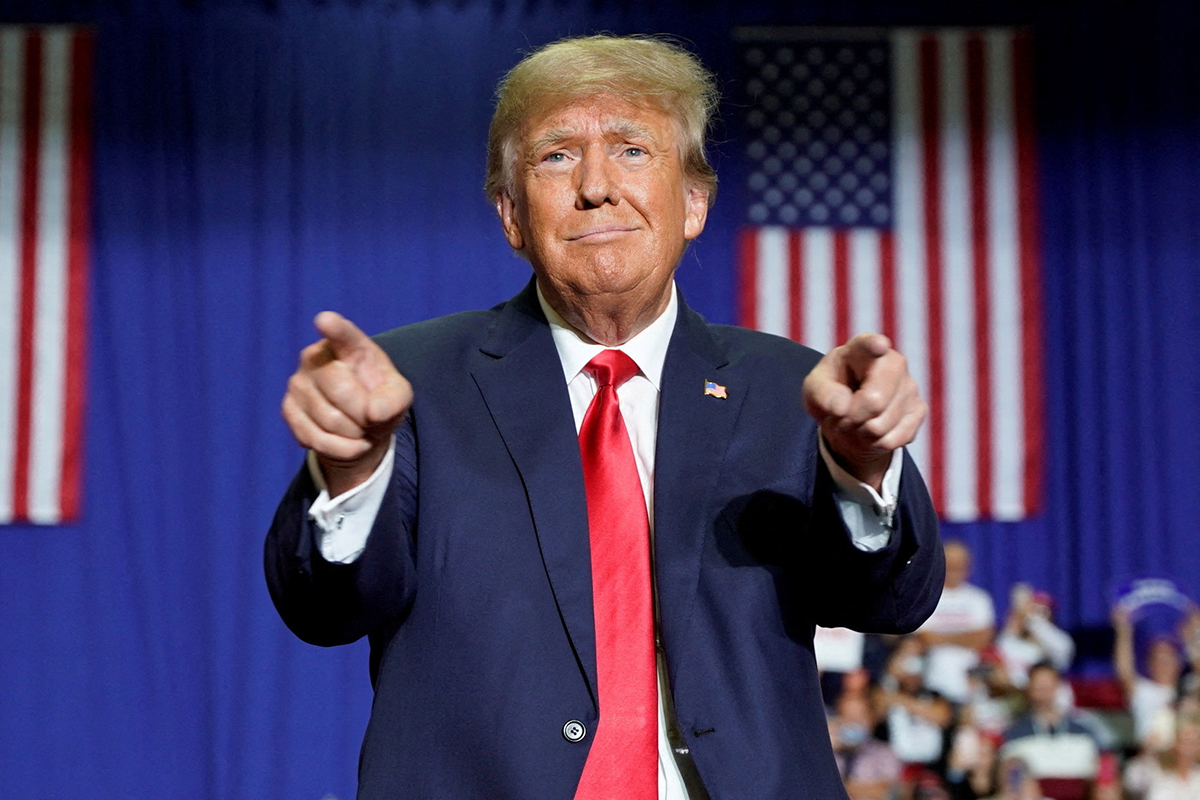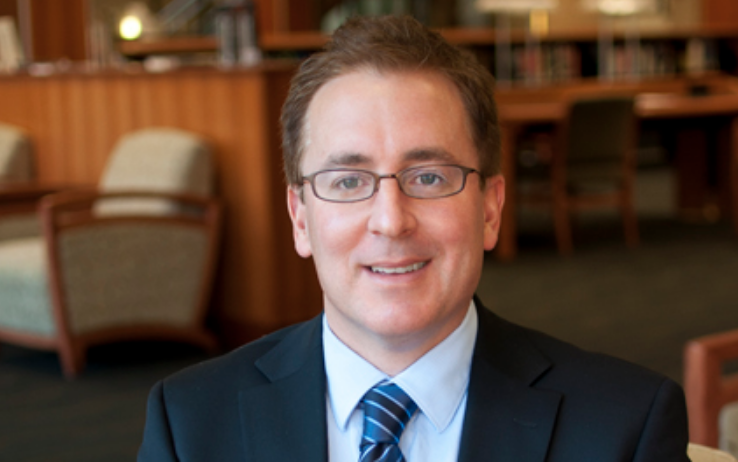In 2019, Timothy Zick, constitutional law professor at William & Mary Law School, published his book “The First Amendment in the Trump Era,” which analyzed and explored the dozens of First Amendment controversies that arose during former President Donald Trump’s 2016 campaign and the first half of his presidential term.
Zick, who has written numerous academic articles focused on freedom of speech, described this time in modern history as one that has “once again reminded us of the need for a free and independent press, the need to protect robust and sometimes caustic criticism of public officials, and the importance of protest and dissent to effective self-government.”
The press was, and is, one of Trump’s frequent targets. He has described the press as the “enemy of the people;” filed multiple defamation lawsuits against numerous publications; and unsuccessfully attempted to take away White House press credentials from two reporters in 2018 and 2019.
Today, Trump criticized ABC News for its handling of last night’s debate against Vice President Kamala Harris. The former president described the network as “the most dishonest news organization,” adding that it “lost a lot of credibility” and should lose its license after moderators David Muir and Linsey Davis frequently fact-checked his claims and, in his view, didn’t treat Vice President Harris the same.
In an interview with First Amendment Watch before the debate, Zick discussed the First Amendment conflicts that arose under Trump, how those disputes might be reanimated if he’s reelected, and expressed his desire for reporters to ask candidates more First Amendment-based questions during a campaign.
Editor’s note: This interview has been edited and condensed for length and clarity.
FAW: In your 2019 book, “The First Amendment in the Trump Era,” you explore and analyze the numerous First Amendment disputes that arose during Trump’s presidency. A lot has changed since then. Why do you believe First Amendment conflicts were so common under Trump?
TZ: I think you’re right that some things have changed, but some things have not. One of the things that — first candidate, then president — Trump did was to focus a lot of ire and negative commentary on the press. During his candidacy and during his term — my book covered about half of his term and then it got published — he was calling the press “the enemy of the people,” he was talking about how he would use his powers as president to punish reporters, to punish media outlets, and beyond that, he insisted on loyalty and certain orthodoxy of views. He used hateful and derogatory speech with respect to women, with respect to racial minorities and others. So I felt like there was already enough there, just from his candidacy and then the beginning of his term, to really merit a look at how Donald Trump viewed the First Amendment, the extent to which he was getting certain fundamental things wrong, or perhaps he was a danger to a free press or freedom of speech more generally.
FAW: In February 2017, Trump tweeted: “The FAKE NEWS media (failing @nytimes, @NBCNews, @ABC, @CBS,@CNN) is not my enemy, it is the enemy of the American People!” How do you think these frequently repeated attacks on the press have affected Americans’ trust in the press? How has this evolved in the 2024 election cycle?
TZ: It’s obviously true that trust in institutional media was not high before Trump started this campaign. But the purpose of the campaign as I understand it, is to undermine not just trust in the press or media outlets, but faith in institutions more generally, faith in the notion that there is some set of baseline facts where we can all proceed from when we argue. He said at one point during a public appearance, “what you’re seeing [and what you’re reading] is not what’s happening,” in a sort of “post-truth way,” undermining the very idea, which is central to a marketplace of ideas, that there is some notion of fact and fiction, truth and falsity. So I think that was the overriding purpose of that agenda, and it continues. As a candidate now, he continues to attack the press. He accuses the media of fomenting unrest rather than himself. He’s filed a multitude of lawsuits against CNN, The New York Times, The Washington Post and other outlets for reporting on ties between Trump and Russia, or just op-eds condemning Trump in some capacity or the other. And he continues to undermine support for a robust press checking government, holding it accountable, particularly when government means him, when he’s president.
FAW: In 2016, Trump alluded to reconsidering New York Times v. Sullivan — the landmark 1964 Supreme Court case that established the actual malice standard — and said he’d “open up” libel laws to make it easier for public officials like himself to sue the press for defamation. Do you expect this conversation to continue if he’s reelected? Is it possible?
TZ: There’s no question that conversation is going to continue. This is part of the difficulty with interpreting Trump. It’s not clear what he meant when he said we’re going to “open up” the libel laws. At the same time he was saying that, he would say, “we’re going to shut down portions of the internet to deal with terror threats and speech.” So there’s a question of “Well, how seriously should I take this?” The survival of New York Times v. Sullivan and the actual malice standard is very much at issue, whether or not he was referring to that back then or not. You now have support for revisiting or overturning that precedent from at least two justices on the current Supreme Court. And it’s not out of the realm of possibility that if Trump were to win the presidency and make two more appointments, they may have a majority of the court interested in revisiting New York Times v. Sullivan, overturning it in total, or revising it in some fashion, whatever the case may be. So that’s become a very serious possibility. It’s gained support, not just in conservative circles, but on the Supreme Court and some lower court judges as well have weighed in on that issue, suggesting that Times v. Sullivan ought to be revisited. There’s a very serious part of this constant attacking the press, and the very serious part is when you talk about legal precedents like that, it would have a major impact on reporting on public officialdom. It’s never clear to me that Trump has thought these sorts of things through. He’d be one of the people likely to be sued. It would be easier to sue Trump because he often attacks public officials, public figures. So it’s not quite clear he’s thought this thing through, but to the extent people are taking this seriously, we ought to as well.
FAW: As a defendant, what kind of remarks has Trump made that would be subject to successful lawsuits against him if Sullivan were substantially changed to make it easier for plaintiffs to win?
TZ: I don’t have specific comments in mind but given (a) Trump’s demonstrated propensity to make false statements and (b) his frequent attacks on public officials and public figures, I can imagine his own statements being the subject of defamation lawsuits. (I’m thinking of Trump the citizen and not Trump the President). If the actual malice standard were to no longer apply when the plaintiff is either a public official or public figure, then it would be easier to bring defamation claims against Trump. He seems to believe that the change would only benefit him as a plaintiff and no one else.
FAW: Is Trump’s way of using social media to communicate with the American people, which contrasts previous administrations, problematic because he’s using a private platform to discuss matters of public concern rather than public statements being issued through traditional media outlets?
TZ: I don’t think it’s generally a problem to try and find other outlets. Other candidates are doing that as well. At some level, it’s smart politics to say, “Well, we’re going to reach different audiences without a filter through social media.” So the Harris campaign and before that the Obama campaign, very social media savvy. Trump, of course, is different because he sort of came up on what was then Twitter and now X. And there is a very live debate about the influence that social media platforms like that have on our public discourse, whether social media platform owners ought to have as much immunity as they currently do under federal law to host speech like disinformation or misinformation or is otherwise harmful, and more generally, whether they should have the level or degree of influence they have because of the number of people who use that platform not just to speak to one another, but to get their news and other information. So that issue is obviously not going to go away. Whatever happens in the presidential election, I think people are going to continue to talk about that. But to get back to your question, I don’t think there’s anything fundamentally wrong with using the platform to speak to supporters or to try to gain support in other quarters.
FAW: On Aug. 26, Meta’s CEO Mark Zuckerberg sent a letter to House Judiciary Committee Chairman Jim Jordan expressing regret over not being more outspoken about the Biden administration “pressuring” the company to “censor” certain content on its platforms, which include Instagram, Facebook, Whatsapp and Threads. The House Judiciary GOP X account described the letter as a “Big win for free speech.” How do you respond to this? Does this give weight to assertions, often made by Republicans, that Democrats are not staunch free speech defenders?
TZ: I think everyone’s an opportunist when it comes to freedom of speech. For Republicans to try and grab that mantle while they try to suppress discussion in classrooms of race and gender, or try to take certain books off shelves, or [the issue you mentioned]. I don’t think there are clean hands necessarily anywhere on that issue. Disinformation and misinformation is a big problem. I don’t know of anyone who would deny that. The question is what to do about it. Can the government regulate the distribution of vaccine denialism or other kinds of harmful information as the government sees it? That poses a very serious First Amendment question. One of the recent cases the court decided said the platforms have rights of their own when they edit materials, so they can’t be forced to convey information they otherwise would not. That doesn’t mean they’re free of all kinds of regulations. It’s more nuanced than that. But, I think the platforms are under lots of political pressure. They have an interest in cooperating with Congress to some degree. They would prefer not to be directly regulated. The Zuckerberg thing, you can make lots of things from that. Is it a savvy political move? Is it actually some sort of mea culpa on free speech? There was evidence the government was pressing the platforms to take down certain information during a global pandemic that was costing millions of lives. There is a line there they cannot cross, and the court didn’t answer whether they had crossed it, because they found that the case wasn’t justiciable.
FAW: How do you see a second Trump term affecting the debate over Section 230 and over potential government efforts to regulate social media platforms?
TZ: I think that’s going to be a debate no matter who prevails in the presidential election. But to the extent that Trump appoints officials and lobbies Congress, he’s already, as I said, indicated his desire to sort of shut down social media for fact-checking him, and he himself had a major case involving people he was blocking from his then-Twitter page, the comment section of it. So this will be a live debate. It’s hard to anticipate how it’s going to go. And part of the reason it’s hard to anticipate is because we don’t know the extent to which Trump and people who support him are willing to press on Section 230 and try to have it repealed or cut back, or in what cases. There’s clearly a sense on the right that the social media platforms are liberal and suppressing conservative speech, so-called. And the question is, well, what are they going to do with that perspective? What’s that going to produce? And we don’t know.
FAW: In some circles, Trump is seen as someone who is a victim of an attack on his free speech rights as a result of multiple gag orders being placed on him during his criminal trials. How do you respond to claims that the gag orders violate the former president’s First Amendment rights?
TZ: Trump has this tendency to invoke the First Amendment everywhere, all the time, when he is the one affected by some sort of regulation, right? So he’s invoked it in the Jan. 6 election interference case, even though the prosecutor said, of course, you’re free to say that the election was fraudulent or stolen, but what you’re not free to do is to conspire with others to overturn it by unlawful means. There’s a certain misunderstanding that Trump himself seems to have about the limit for the First Amendment, that it doesn’t give him sort of an absolute right to say whatever he wants, to commit fraudulent transactions, to attempt to interfere with an election, or even in the context of his trial, to dox or to threaten judges or their family members. It is an unusual case, because, as he reminds people, he’s a presidential candidate, but that doesn’t give you any special First Amendment rights to threaten judges or dox their families or do any of those other things. So there’s not a lot of law on gag orders with respect to defendants, because most of the time, criminal defendants don’t seek out the limelight. They don’t want to antagonize judges who are in charge of their potential sentencing and so forth. But Trump is different in that respect. So there’s a lot of noise around the gag orders and the First Amendment, but given the statements he had made and his proclivity to violate every order the judge was giving him, there really wasn’t much choice.
Most criminal defendants don’t have a political reason to do that. Again, you simply don’t have this sort of absolute cloak and shield called the First Amendment that allows you to do and say all the things that he is accused of doing and saying. So one of the things that I noticed, and one of the reasons I thought the book was worth writing was, here we have a person who becomes the President of the United States, and certainly has lots of thoughts about what the First Amendment protects or doesn’t protect, and what it’s for, but in most cases, he’s fundamentally wrong about all of it. And so it was worth revisiting. Why do we have a free and independent press? Why are protesters allowed to do that? And to sort of defend some traditional notion of the free press and people’s ability to dissent, even against someone as powerful as a president, and to take a knee rather than salute the flag, for example, that was a big controversy. And one of the cluster of things that I actually didn’t get into the book because they happened afterwards, is, of course, the protests that happened in 2020 where Trump called the protesters “thugs,” and threatened to call in the U.S. armed forces to quell unrest. So there are a whole host of things since the book was published that implicate the First Amendment, and I think are well worth talking about, but also, in some sense, worrying about. If he does become president now he’s threatened more explicitly to go after his enemies, not just in the press, but his political enemies; to invoke the Insurrection Act if there are protests. The Trump Era just raises so many different First Amendment issues.
FAW: What do you know of Kamala Harris’ views on free speech and press freedom? Where does she stand in the same conversation we’re having about Trump?
TZ: I don’t think there’s anyone that could plausibly compare to Donald Trump in terms of the number of First Amendment issues they address and themselves raised through their own conduct. So it’s harder to know what commitment Kamala Harris or Tim Walz have to free speech. Walz has been criticized for not shutting down protests in Minneapolis and other places more quickly, even though he called in the National Guard. Kamala Harris has been criticized politically for not sitting down for press interviews, but she [just did one]. But that doesn’t necessarily mean she doesn’t support a free and independent press, free of governmental regulation, for example. So it’s more difficult to know. One of the things that’s unique about Trump is that he tells you, for better or worse, what he’s thinking, about free speech, protests, higher education, academic freedom and just a range of issues, and it is much harder to know, for really any presidential candidate that I’m aware of in history, frankly, what they think about all of these things. So I think the test will be if you had a Kamala Harris presidency, and you had press reports based on leaks of classified information, does the Justice Department go after the press in those cases? And what would be her response, or Walz’s response, to public protest? Because we will see more protests. I’m quite sure of it. So we’ll have to wait and see, I think, to sort of flesh that out.
As you know, reporters don’t typically ask the candidates about Section 230 or press freedoms, they don’t have much of a conversation about the First Amendment. It doesn’t seem to pop up on the campaign radar. Maybe it should. It’s certainly important enough that one would want to know “Well, what would be your position on social media platform immunity? What do you think we should do about the harm to girls, for example, with respect to some of the functions on social media?” And more general issues. So I wish it were so that the press itself was more interested in sort of sussing out the candidates positions. But I also recognize there’s just a long agenda of things the press wants to talk about — policies about tax and housing and healthcare and all the rest — that sort of crowd these things out. But to just go back briefly to our conversation about New York Times v. Sullivan, to some extent, that case may be on the ballot. And it’s unfortunate we’re not having more of a conversation about that.
More on First Amendment Watch:



